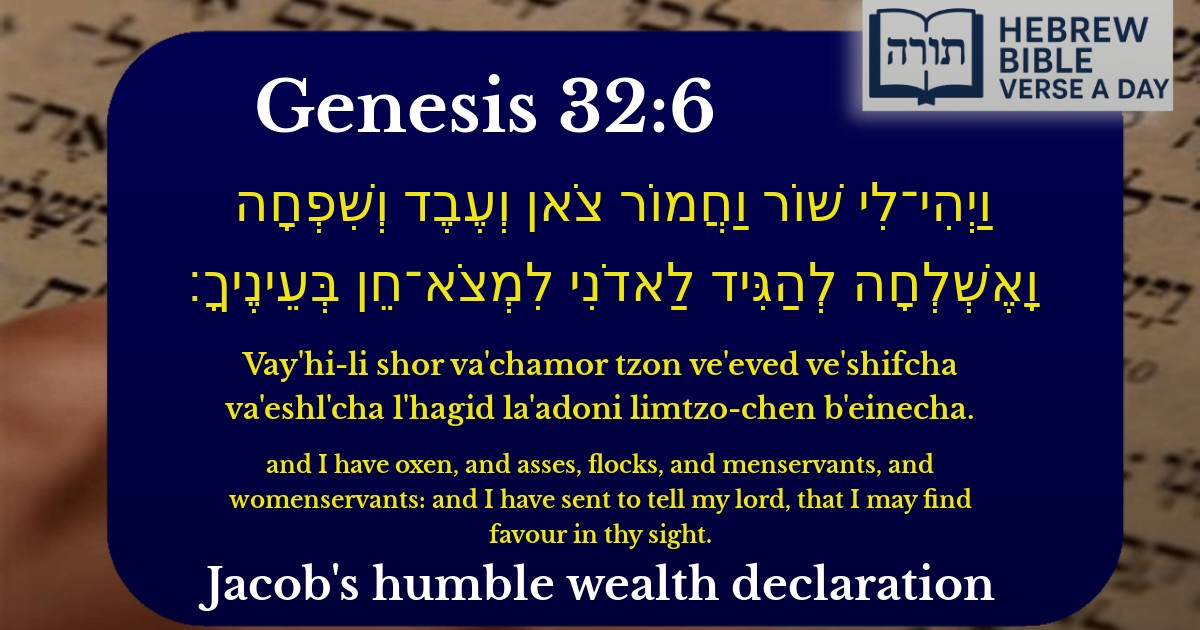Join Our Newsletter To Be Informed When New Videos Are Posted
Join the thousands of fellow Studends who rely on our videos to learn how to read the bible in Hebrew for free!
Hebrew Text
וַיְהִי־לִי שׁוֹר וַחֲמוֹר צֹאן וְעֶבֶד וְשִׁפְחָה וָאֶשְׁלְחָה לְהַגִּיד לַאדֹנִי לִמְצֹא־חֵן בְּעֵינֶיךָ׃
English Translation
and I have oxen, and asses, flocks, and menservants, and womenservants: and I have sent to tell my lord, that I may find favour in thy sight.
Transliteration
Vay'hi-li shor va'chamor tzon ve'eved ve'shifcha va'eshl'cha l'hagid la'adoni limtzo-chen b'einecha.
Hebrew Leining Text
וַֽיְהִי־לִי֙ שׁ֣וֹר וַחֲמ֔וֹר צֹ֖אן וְעֶ֣בֶד וְשִׁפְחָ֑ה וָֽאֶשְׁלְחָה֙ לְהַגִּ֣יד לַֽאדֹנִ֔י לִמְצֹא־חֵ֖ן בְּעֵינֶֽיךָ׃
וַֽיְהִי־לִי֙ שׁ֣וֹר וַחֲמ֔וֹר צֹ֖אן וְעֶ֣בֶד וְשִׁפְחָ֑ה וָֽאֶשְׁלְחָה֙ לְהַגִּ֣יד לַֽאדֹנִ֔י לִמְצֹא־חֵ֖ן בְּעֵינֶֽיךָ׃
🎵 Listen to leining
Parasha Commentary
📚 Talmud Citations
This verse is not quoted in the Talmud.


Context of the Verse
This verse (Genesis 32:6) appears in the narrative of Yaakov (Jacob) sending messengers to his brother Esav (Esau) before their anticipated meeting. Yaakov lists his possessions—oxen, donkeys, flocks, and servants—as part of his message to Esav, expressing humility and seeking favor ("לִמְצֹא־חֵן בְּעֵינֶיךָ"). The verse reflects Yaakov's strategy to appease Esav and avoid conflict.
Rashi's Commentary
Rashi (Rabbi Shlomo Yitzchaki) explains that Yaakov's mention of his possessions was not merely a boast but a calculated diplomatic move. By detailing his wealth, Yaakov sought to convey that he was not coming to claim any inheritance from their father Yitzchak (Isaac), as he had already been blessed with material success. Rashi emphasizes that Yaakov's phrasing—"וָאֶשְׁלְחָה לְהַגִּיד לַאדֹנִי" ("I have sent to tell my lord")—demonstrates his humility, referring to Esav as "my lord" despite being the rightful heir of the blessings.
Rambam's Perspective on Humility
Rambam (Maimonides), in Hilchot De'ot (Laws of Ethical Conduct), highlights the importance of humility and peaceful relations, even with adversaries. Yaakov's approach aligns with Rambam's teaching that one should go to great lengths to avoid strife. By presenting his wealth and referring to Esav with respect, Yaakov exemplifies the principle of "דרכיה דרכי נועם" ("her ways are ways of pleasantness," Proverbs 3:17).
Midrashic Insights
Practical Lessons
This verse teaches the value of diplomacy and humility in conflict resolution. Yaakov, despite holding the moral and spiritual high ground, chooses to approach Esav with deference. The Talmud (Megillah 16b) derives from this episode that one should always seek to "appease an adversary" (לְפַיֵּס אֶת הַשּׂוֹנֵא), reinforcing the Torah's emphasis on peace.